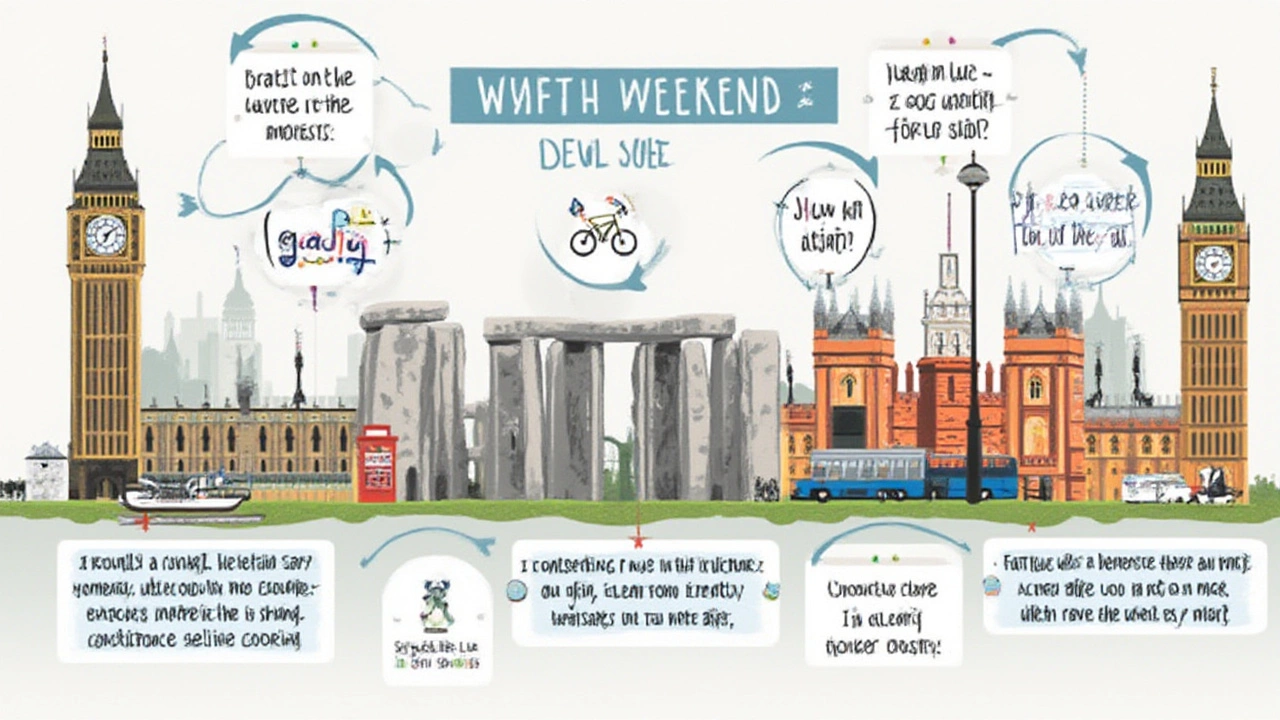Ever caught a Brit casually dropping, “I went to the beach at the weekend”? For North Americans—myself included—it stops you mid-sentence. Something feels a bit off. We've grown up saying "on the weekend," never thinking twice. But walk the streets of London, Manchester, or Edinburgh, and "at the weekend" is everywhere. This isn’t just a weird quirk but a genuine language wrinkle. It kicks up some fun debates among grammar geeks, travelers, expats, and people like me who are just fascinated by how language shapes identity. So, what's the deal?
The Peculiar Charm of "At the Weekend"
British people don’t just say "at the weekend"—they really, seriously mean it. If you watch British TV, tune into BBC radio, or just eavesdrop in Liverpool, you'll hear it constantly. "What are you up to at the weekend?" pops up in chats with friends, emails from your London office, or even in the way a teacher invites kids to share their plans. It's not just a phrase; it sets Brits apart from Americans, who would say, “on the weekend.”
Now, grammatically, both are correct in their respective countries, but in the UK, "at the weekend" feels natural—almost nonchalant. It's as British as Big Ben and a hot cup of tea. Brits also use “at weekends” (no ‘the’) if they mean something that happens routinely, like "I play football at weekends." Not every region in Britain uses it the same way, but in England, at least, it's the norm. Quick fact: in Ireland, you'll often hear "at the weekend" as well, while Australians and Canadians stick to "on the weekend." Even within Britain, accents twist the phrase up in surprising ways—think “atay weekend” in a Scouse accent.
Why "at"? English preposition use is a linguistic rabbit hole. British English tends to think of the weekend as a broader time period, hence "at." It’s like saying, “at Christmas” or “at Easter”—events or intervals, not fixed points. American English feels the weekend is more like a specific spot in the week, hence "on the weekend." Grammar guides from Oxford and Cambridge both list "at the weekend" as the British standard. Swap to American dictionaries, and it’s "on the weekend." There’s no winning this tug of war, just cultural flavor.
This isn’t just about weekends. British and American English split on plenty of phrases: “in hospital” vs. “in the hospital,” “at university” versus “in college,” or “on holiday” vs. “on vacation.” Brits seem to love “at,” maybe because they see these timeframes as containers, while Americans focus on their boundaries. When you’re chatting to someone from the UK and you say "on the weekend," don’t be surprised if you get a raised eyebrow—or a gentle correction. They’re proud of their way of speaking, and honestly, who can blame them?
So, does "at the weekend" sound fancier or more formal? Not really. It’s standard, conversational, and hits you with a touch of everyday Britishness. It’s one of those phrases you should pick up if you're planning to travel, study, or move across the pond. It slips naturally into casual talk, and nothing feels more awkward than trying to sound local and coming out like a tourist. If you’re a fan of British comedy, you’ll spot it in shows like "The Office UK," "Fleabag," or "Gavin & Stacey." It's the rhythm of British small talk—a grin, a cup of tea, and a quick “What are you up to at the weekend?”
When you hear or read “at the weekend,” you’re grabbing a piece of British identity. It sits alongside saying “cheers” instead of “thanks” or “queue” instead of “line.” If you want to fit in, start swapping your "on" for an "at." Brits won’t give you a medal, but you might get an approving nod—or at least avoid a confused look. Little prepositions, big meaning. There’s real charm in it.
If this all sounds like splitting hairs, think again. When you’re living abroad or trying to nail down the nuance in another form of English, these tiny tweaks make the difference between blending in and standing out. They don’t just mark your speech; they mark your attitude towards language, too. There’s something satisfying about slipping into the rhythm of a British conversation and feeling less like a visitor, more like an insider.

History and Spread: How Did "At the Weekend" Become a Thing?
This isn’t just modern slang or the result of TV—there’s a history under the hood. The "at the weekend" phrase shows up in written British English as far back as the early 20th century, possibly earlier. If you crack open a dusty Penguin novel or scan old BBC radio scripts, you’ll spot it woven into the language of everyday characters. It didn’t happen overnight; British English just evolved separately from its American cousin after the colonial era. Maybe the most surprising piece? The United States itself used “at the weekend” before drifting toward “on the weekend” sometime in the 19th century.
Linguist Lynne Murphy—author of The Prodigal Tongue—points out this split follows a pattern. The UK loves preposition shifts in general: "at school," "at uni," "at the weekend." The US started to drift toward different prepositions ("in school," "on the weekend"), possibly because of rising influence from German immigrants, regional dialects, or just a tendency to tidy up language and make it more regular. Some scholars even connect it to early American grammar books tilting toward more literal usage, treating weekends as points in time rather than periods.
Let’s not forget the power of pop culture. While Americans might recognize "at the weekend" thanks to the internet, shows like Doctor Who, and viral British TikToks, it still hasn't broken into daily use here. Canadians, living right next door to the US—and, yes, speaking from chilly Toronto—have glued themselves to "on the weekend." Meanwhile, Australia saw both forms for a while but settled on "on the weekend." British and Irish expats brought “at the weekend” with them across the world, but local English almost always wins out.
The spread of British English, especially post-colonial, meant pockets of "at the weekend" formed in places like India, South Africa, and former colonies, while local twists developed. In South Asian English, you’ll still hear both at and on, though younger speakers seem to follow US trends online. South Africans lean toward “on the weekend,” while Caribbean English is mixed. Next time you’re passing through Dublin or Cape Town, try starting a conversation with a question about weekend plans—see which preposition lands you a smile.
What about the future? British English still sets the pace on this side of the pond, and there’s zero sign of "at the weekend" vanishing. If anything, it’s a badge of pride. Teachers, parents, and even branding experts will often stick to the classic version for extra British flavor. Translation tip: if you’re switching between UK and US content for work or study, swap “at the weekend” for “on the weekend”—it’s a quick fix that stops copyeditors sweating.
You might hear, "Do British people say 'on the weekend'?" The official answer: rarely. It sounds American to most Brits, and unless they're aiming for a US market, they keep it homegrown. Some young Brits exposed to loads of American media might slip up, but schools are quick to set them straight. So if you want to keep things authentic and flow with the UK crowd, “at the weekend” is your golden ticket.

How to Sound More British: Tips and Fun Weekend Phrases
It’s one thing to know about “at the weekend.” It’s another to use it without sounding awkward. If you want to blend in—whether for a quick holiday, a work stint, or just to sound less like a foreign film dub—here’s how you do it right. The biggest tip? Don’t overthink it. British English prizes subtlety; you want your use of “at the weekend” to sound tossed off, not rehearsed.
- "What are you doing at the weekend?" (Standard, casual, and endlessly flexible.)
- "I might go for a walk at the weekend if the weather’s nice." (Polite optimism… and a nod to the famously unpredictable UK skies.)
- "At weekends, I catch up on sleep." (For anything you do regularly—naps, football, grocery shopping, you name it.)
- "Had a cracking time at the weekend." (Throw in some British slang—like "cracking"—to really fit in.)
- "We’re meeting friends at the weekend for a roast." (The Sunday roast is a big deal in the UK… don’t mess it up.)
- "The roads get busy at the weekend." (A little social commentary never hurts, especially stuck on the M25.)
Want to sound extra local? Slide in more British-isms:
- “Fancy a pint at the weekend?” Not a beer drinker? Try "cuppa" for tea instead.
- “Going up north at the weekend to see the family.”
- “Hope to have a lie-in at the weekend.” (That’s a late sleep-in for all the non-Brits.)
- “Might nip to the shops at the weekend.” (“Nip to” just means a quick visit.)
And get this—British office emails love the phrase. You’ll regularly find: “Can we touch base at the weekend?” or, more cautiously, “Happy to address this at the weekend if it can’t wait.” Work-life balance is important in the UK, though, so late Friday emails might earn you an apology and a cheery, “Let’s sort it at the weekend—if needs must!”
You might worry you’ll sound phony, but here’s the trick: watch British TV, listen for the pace and delivery, and practice with safe, low-pressure phrases. For travelers, knowing the right way to refer to the weekend does wonders. Book a table or ask the bus driver about schedules “at the weekend,” and you’ll find conversations just run smoother. Restaurant hours, museum entry, even traffic patterns—they often shift at the weekend in the UK, so staff are used to hearing the phrase. You’ll blend right in, and even score the occasional hometown recommendation.
Quick tip—don’t try to force “at the weekend” into every sentence. Brits keep things low-key. If you're chatting with a Scot, listen before you leap; Scottish usage sometimes overlaps with England, but can include regional twists. In Wales, too, you’re more likely to hear “at the weekend,” but expect a stronger accent or two to keep you guessing. If you're ever unsure, just ask. Brits love to talk about how they talk—especially when it comes to local slang and quirks. You might learn something new about "proper" English you never picked up in school.
Why not try swapping your usual speech for a day and see how it feels? You'll probably notice how language influences mood, conversation rhythm, and even how people react to you. With British English, those little touches make all the difference.
Language isn’t just about getting your point across; it’s about connecting, joking, and building a sense of place. Next time someone asks what you’re up to at the weekend, you'll know exactly what to say to fit right in—or at least sound like you tried. Now, who’s up for a Sunday roast?

Menu